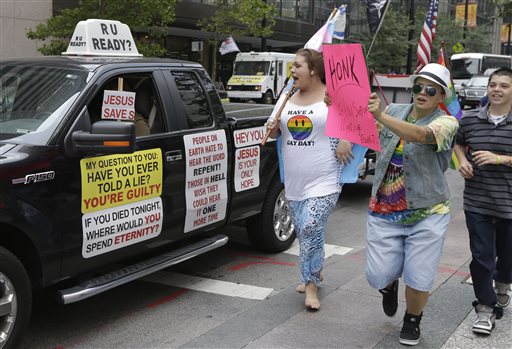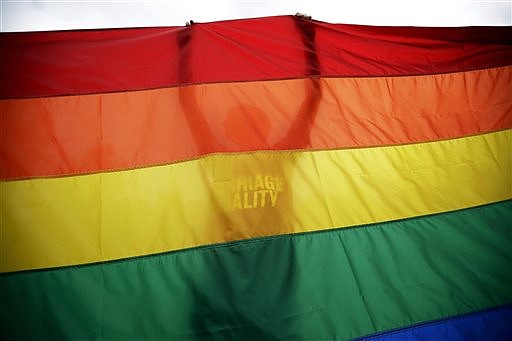What Tennessee's Constitution Says
The historical institution and legal contract solemnizing the relationship of one man and one woman shall be the only legally recognized marital contract in this state. Any policy or law or judicial interpretation, purporting to define marriage as anything other than the historical institution and legal contract between one man and one woman is contrary to the public policy of this state and shall be void and unenforceable in Tennessee. If another state or foreign jurisdiction issues a license for persons to marry and if such marriage is prohibited in this state by the provisions of this section, then the marriage shall be void and unenforceable in this state.
In a landmark announcement, a federal court today closed the door on gay marriage in Tennessee.
The 6th Circuit Court of Appeals in Cincinnati upheld a Tennessee law that defines marriage as between a man and a woman, and which does not recognize same-sex marriages from other states.
What happens next is still undetermined. The Supreme Court recently decided "not to decide" on gay marriage cases, but it will likely jump in because the 6th Circuit's ruling creates a split decision, veering away from other appellate courts in the country.
Lt. Gov. Ron Ramsey, the powerful state Senate speaker, took to Facebook to applaud the decision.
"Eight years ago, Tennessee voters went to the polls and voted overwhelmingly for a constitutional amendment to define marriage as a union between one man and one woman.
"Today's ruling by the Sixth Circuit Court of Appeals explicitly affirms our state's right to define marriage. This is a victory for states' rights and traditionalism in Tennessee -- but final battle has not yet been fought.
"Courts will continue to grapple with this issue in the months and years ahead and those of us who believe in traditional marriage must continue to fight for our values."
 This file photo shows gay marriage supporters following an opponent of gay marriage driving his truck around Fountain Square where several hundred gay marriage supporters held a rally in Cincinnati. On Thursday, Nov. 6, 2014, the 6th Circuit Court of Appeals in Cincinnati upheld a Tennessee law that defines marriage as between a man and a woman, and which does not recognize same-sex marriages from other states.
This file photo shows gay marriage supporters following an opponent of gay marriage driving his truck around Fountain Square where several hundred gay marriage supporters held a rally in Cincinnati. On Thursday, Nov. 6, 2014, the 6th Circuit Court of Appeals in Cincinnati upheld a Tennessee law that defines marriage as between a man and a woman, and which does not recognize same-sex marriages from other states.Alexia Poe, communications director for Republican Gov. Bill Haslam of Tennessee, had no comment on the court's ruling except to say, "we're reviewing the opinion. We just received it and it is 73 pages."
Efforts to reach a spokeswoman for Tennessee Attorney General Herbert Slatery were unsuccessful.
The panel that heard arguments on gay marriage bans or restrictions in Ohio, Michigan, Kentucky and Tennessee on Aug. 6 split 2-1, with Circuit Judge Jeffrey Sutton writing the majority opinion. The ruling revealed Thursday creates a divide among federal appeals courts, increasing the likelihood the Supreme Court will now take up the issue.
The ruling concluded that states have the right to set rules for marriage.
Continuing coverage
Frequently-asked questions about gay marriage rulingTennessee gay marriage debate takes center stageSupreme Court clears the way for gay marriage expansion
It followed more than 20 court victories for supporters of same-sex marriage since the U.S. Supreme Court struck down part of the federal Defense of Marriage Act last year. A federal judge in Louisiana recently upheld that state's ban, but four U.S. appeals courts ruled against state bans.
The issue appears likely to return to the Supreme Court so the nation's highest court can settle whether states can ban gay marriage or that gay and lesbian couples have a fundamental right to marry under the U.S. Constitution. Thirty-two states recently asked the Supreme Court to settle the issue once and for all.
The high court on Oct. 6 unexpectedly turned away appeals from five states seeking to prohibit gay and lesbian unions. The court's order effectively made gay marriage legal in 30 states. The San Francisco-based 9th Circuit Court of Appeals the next day overturned same-sex marriage bans in Idaho and Nevada, the fourth federal appeals court to rule against state bans.
Justice Ruth Bader Ginsburg recently told a Minnesota audience that the 6th Circuit's then-pending ruling would likely influence the high court's timing, adding "some urgency" if it allowed same-sex marriage bans to stand.
Before the 9th's Oct. 7 ruling, three other appellate courts, the 10th Circuit in Denver, the 4th Circuit in Richmond, Virginia, and the 7th Circuit in Chicago, overturned statewide gay marriage bans in Wisconsin, Indiana, Oklahoma, Utah and Virginia over the summer, ruling that they were unconstitutional.
During the Aug. 6 arguments, it was apparent that Sutton would be the deciding vote, with the two other judges clearly on opposite sides of the debate.
Sutton vigorously questioned each side's attorneys, though he repeatedly expressed deep skepticism that the courts were the best place to legalize gay marriage, saying that the way to win Americans' hearts and minds is to wait until they're ready to vote for it.
"I would have thought the best way to get respect and dignity is through the democratic process," Sutton, a George W. Bush nominee, said at the time. "Nothing happens as quickly as we'd like it."
Michigan's and Kentucky's cases stem from rulings striking down each state's gay marriage bans. Ohio's two cases deal only with the state's recognition of out-of-state gay marriages, while Tennessee's is narrowly focused on the rights of three same-sex couples.
Plaintiffs include a Cincinnati man who wants his late husband listed as married on his death certificate so they can be buried next to each other in a family-only plot and a Tennessee couple who both want to be listed on their newborn daughter's birth certificate.
INTERACTIVE TIMELINE:
INTERACTIVE MAP:
